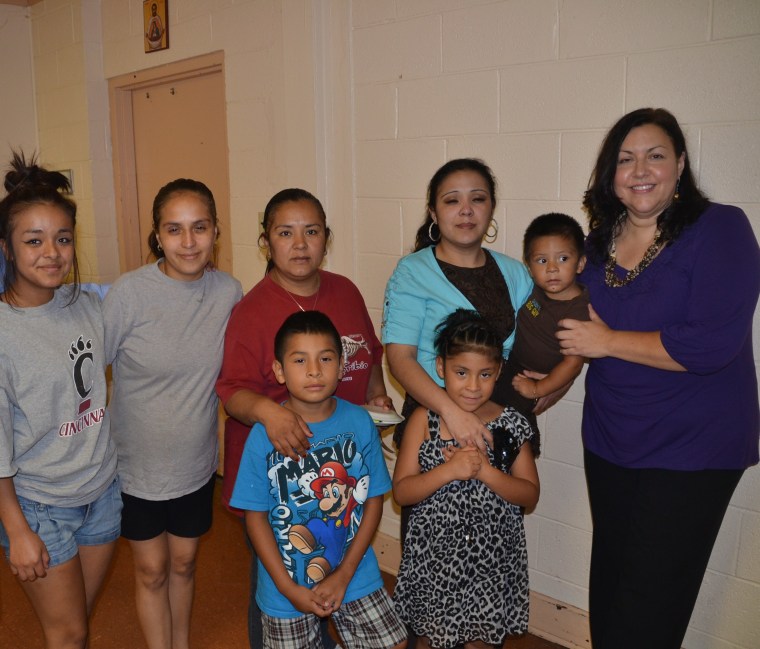Sept. 15 marks the start of National Hispanic Heritage Month—or, as it is known in Spanish, Mes de la Herencia Hispana —a time when the United States pays tribute to the history, culture and contributions of past and present Hispanic Americans.
According to the 2010 Census, 50.5 million Americans identify as Hispanic—and that number is growing. Immigration has long been a part of America’s national history, and the role that immigrants have played—and still play — in building this country is one of the reasons “the American dream” is still shared around the world today. America is a place where new beginnings and new lives are possible.
From Sept. 15 to Oct. 15, msnbc.com will be profiling outstanding Hispanic activists who are making a difference in the fight for immigration reform and who are providing critical support services to undocumented communities.
"I often feel like a circus performer spinning plates—each deportation case is high-stakes and requires quick action."'
Name: Veronica Isabel Dahlberg
City, state: Ashtabula, Ohio
Occupation/organization: Executive director, HOLA Ohio
How did you get involved with immigration advocacy?
Over 20 years ago I worked on a two-week university project interviewing farm workers on Virginia’s eastern shore. I was shocked at the working and living conditions for these 5,000 Mexican immigrants picking America’s crops. I saw how pesticides, long hours in the blazing sun, low pay and decrepit housing took a toll on them. I ended up staying eight months trying to learn how to organize the workers to improve their lives, a commitment I carry on to this day.
Give us a sense of what your day looks like.
A typical day involves fielding calls from desperate immigrants in deportation, finding ways to keep them here with their families, whether through a public action or legal maneuver. I often feel like a circus performer spinning plates — each deportation case is high stakes and requires quick action. I contact elected officials, lawyers and other leaders daily. I drive to immigration in Cleveland, HOLA meetings, sometimes I drive 1,000 miles weekly. I delegate tasks to HOLA volunteers, and consult my mentors to strategize or get moral support.
What is the biggest misconception about immigration reform/undocumented immigrants?
The biggest misconception about undocumented immigrants is that they are an economic drain on our country, and that immigration reform will negatively change America and all it stands for. As a patriotic American, I have come to appreciate their work ethic, love of family, and can-do attitude. I’ve seen how they are an indispensable part of our labor force and economy. They work hard and live frugally to build their American dream. When given the opportunity to learn and participate, they quickly adopt all that is great about America.
What is your expectation of President Obama and Congress in regard to the border crisis?
Given recent world events such as terrorism, and the thousands of children arriving at our southern border due to rampant crime in Mexico and Central America, it’s imperative that President Obama and Congress address the immigration issue. There is not only a growing humanitarian crisis and an economic opportunity, but also an urgent national security need to develop intelligent and effective policy regarding the border and the 10 million undocumented immigrants and their families. Our political leaders must put aside the partisan politicking and put America first.
What type of help is most needed on the ground and how can one get involved?
The biggest need in terms of getting involved is to help grassroots organizations working directly with immigrants. Groups like HOLA need volunteers and funding to help bring immigrants out of the shadows and teach them how to be good citizens, that is--informed and active participants in our democracy who understand both their rights and responsibilities. We need voters to contact their representatives and tell them we still believe in America’s promise, that regardless of culture, socioeconomic status or religion, a nation of immigrants can unite as one.
Was there ever an instance when you felt defeated? What made you keep going?
I have felt defeated too many times. What keeps me going are thoughts of James Earl Chaney, Andrew Goodman and Michael Schwerner. We can never give up. Martin Luther King Jr., all the civil rights heroes, unsung and otherwise. Our American military, those who so bravely volunteered and risked their lives to protect all we hold dear. Memories of my parents, who became U.S. citizens — my dad, a Hungarian immigrant who put on a suit when he voted, and my mother, a Mexican immigrant who joined him every Election Day.
(These responses have been edited for clarity)
Follow Veronica on Twitter @HOLAOhio
For more on Veronica, read: Immigrant families in Ohio find a guardian angel
